Janacek: Jenufa (Bolton)
Janacek's first opera took him six years to write, and has become a staple of 20th century operatic repertoire since its first performance in January, 1904 when the composer was already 49 years old. It is a story of bitter rivalry, jealousy, child murder and redemption, and is not an easy ride, but if you're willing to stick it out, you'll be well-rewarded.
The music is already noticeably 'different' to much of what was going on in Europe at the time, and Janacek's sound world of his later years is creeping through, despite several obviously Italian and Wagnerian influences. Of course, being a Czech composer (although it would be more correct to call him 'Moravian', the area controlled by the Austrian empire at the time), there is also an important use of folk melodies and styles wrapped up in his fascinatingly modern orchestration.
The original version of the music was considered a little too difficult for contemporary theatres and audiences to cope with and so, ironically, it was a revision by the composer Karel Kovarovic that helped make the work so popular. Only 70 or so years later did the first version of the work make a re-appearance and this is the one now performed. Kovarovic's own compositions have mostly been forgotten
Based on a play entitled 'Her Stepdaughter' (also the original title of the opera), the plot is as follows (please excuse the lack of correct characters in the names…not all are able to be displayed within the MyReviewer site and so I have dispensed with them all for clarity):
Act 1
Jenufa is the step-daughter of the village sacristan, Kostelnicka (the widow of the church warden). She is secretly pregnant by Steva, a generally drunken braggart who fancies himself with the women and who looks likely to be drafted by the army. Jenufa would much prefer he wasn't.
Laca, Steva's half-brother is insanely jealous of Steva, not just because he is in love with Jenufa as well, but Steva is set to inherit the town mill due to an accident of marriage and birthright.
Steva has actually escaped the draft, and appears with several soldiers after another heavy drinking session boasting about how great he is with the women, forcing Jenufa to dance with him. Things being to get very rowdy indeed before Kostelnicka steps in and orders that the celebrations be broken up. Appalled at Steva's condition, she insists he stay sober for a year before even contemplating marrying Jenufa. Jenufa herself begs Steva to love her, but as he has not idea she is pregnant, he fobs her off with excuses and leaves.
Laca turns up and tries to convince Jenufa that Steva's not the man she thinks he is, and is certainly not the man for her. Jenufa refuses to admit this and Laca tells her Steva only pays attention to her because of her rosy cheeks, which he deals with by slashing her face with a knife. Jenufa runs off and Laca is left regretting this compulsive act.
Act 2
Months later, Jenufa's baby has been born and babtised, but Kostelnicka, to prevent any more shame from being piled upon her family, hid Jenufa away, telling everyone that she had gone to Vienna.
Steva is summoned and Kostelnicka tells him in no uncertain terms that he has to take responsibility and marry Jenufa. Steva says he'll pay money for upkeep, but since she is permanently scarred from the knife, he can't love her. Anyway, he is engaged to the Mayor's daughter now.
Laca turns up and Kostelnicka tells him of the baby. Laca promises to stay by Jenufa's side, whatever the consequences, even when Kostelnicka lies about the baby having in fact died. Laca leaves, and Kostelnicka finally decides that the baby has to be killed to prevent any more perceived shame. She wraps the child up and carries it out.
Jenufa wakes up and looks for her baby. She assumes Kostelnicka has taken him out to show him off, but when Kostelnicka returns, she is given the news that he died while she was asleep. The initial shock is tempered by the fact that Laca has returned promising to look after Jenufa, and marry her is she will accept him. Kostelnicka is delighted about this, and convinces herself that her actions have all been for the best, despite having imagining she can hear the baby cry.
Act 3
Preparations are under way for Jenufa and Laca's wedding. Laca, in an effort to make peace, has even invited Steva and Karolka, the Mayor's daughter. Jenufa still has doubts, but Laca presents her with a special bouquet of flowers and convinces her this is the right thing to do.
Just when Kostelnicka is to give her blessing to the couple, screams are heard from outside, and news quickly gets to everyone that the body of a baby has been found underneath the melting spring ice. Jenufa cries out that it must be her own child when she recognises its red bonnet, and the villagers, assuming Jenufa must have killed it, decide she must die herself.
Kostelnicka appeals for calm and in a rare moment of humility, admits to the murder, much to the shock of everyone assembled. Explaining her reasons to Jenufa, she is eventually forgiven before being led off to jail.
Karolka is disgusted by Steva's involvement in, and behaviour throughout the affair and immediately calls of their own wedding, leaving Steva to mull everything over to the villagers calling out that not even a peasant girl would want him now.
Jenufa and Laca are left alone.
Stéphane Braunschweig's production is fairly minimalist, in that there's little to get in the way of the drama unfolding on stage, and this is a good thing. There are some nice touches, such as the effective (but creaky) windmill device that comes up through the floor and the snow (so much of it I'm surprised some wasn't swallowed accidentally) appearing in Act 2. Much of the design is black, white or red and this colour scheme is also reflected in Thibaut Vancraenenbroek's costumes, which seem to belong to various time periods, but generally retain the mid-European rustic 'folkiness' that the story demands. At times, the more 'stripy' clothes create an irritating wobbling when the wearer moves, but this is something you can't really avoid in a 'live' filmed environment.
Marion Hewlett's lighting probably looked superb in the theatre, and can have some quite startling effects on disc, however there are moments where things are literally 'black and white', in that when small areas of the stage are bathed in bright light, the rest is, understandably, darkened. This causes some very noticeable problems with the NTSC transfer, and I had to tweak the brightness and backlight on my TV to prevent digital 'throbbing' in the shaded areas. Unfortunately, this meant that a lot of the other scenes then appeared too dark. I'm sure there's an ideal setting, but this really got in the way of my enjoyment. Subtitles can also be difficult to read when things get too bright on stage.
In the pit, Ivor Bolton is passionate and enthusiastic, and the Madrid Symphony Orchestra plays beautifully, and in general, very tightly. There were a few moments however that stood out which weren't particularly together, and I suspect Bolton was the culprit. The TV director (Ãngel Luis Ramiréz) enjoys pointing the cameras into the pit, and this is quite often an illuminating experience, but when we see Bolton in full flow at the beginning of an Act there's so much extraneous movement with the stick hand that the actual beat is lost in some sort of balletic exercise for conductors. It's no wonder a few of the more intricate passages are sometimes untidy. I'm also intrigued about why we have to see so much of what goes on in the pit during breaks in the performance, but I suppose I'll never know.
Apart from this, Bolton has a real command of the score, and if anything, becomes more convincing as the work goes on. Some moments stand out as a masterclass of timing, especially the huge pause in Act 2 in Jenufa's mourning for her child. There's no music here of course, but as with all the great performances, often the silences speak the loudest.
The sound is often very good, but I sometimes got the impressions there had been some 'tinkering' with the balance in Janacek's more 'expansive' moments. Neither the stage or pit seems too prominent though, and everything is clear enough, despite some stage mics not picking things up quickly when some characters turn their head suddenly.
On stage, there is no real weak link amongst any of the cast, and this is the one reason why I'll be returning to this version as often as I can.
Amanda Roocroft's Jenufa is a more mature character than you may like for the role, but there's no arguing that her great experience in singing it makes for an almost perfect rendition. Her quiet top notes are superb, and her grieving in Act 2 is incredibly moving. She is also a very fine actress, which the close ups on the film showing an unbreaking responsiveness to those around her. The look of pain on her face when the village girls dance at her wedding in comedy 'pregnant' costumes is almost heartbreaking.
Deborah Polaski (Kostelnicka) is not one of the most 'active' Kostelnicka's I have seen, yet vocally she matches the best of them (and I'm especially thinking of Anja Silja in this respect). She is an imposing character, and exudes a large amount of guilt, shame and a decent amount of menace as she self-destructs.
The two main male roles contain some of the most riveting and difficult writing in the operatic repertoire, if only due to the huge range Janacek demands from the singers. Nikolai Schukoff (Steva) and Miroslav Dvorský (Laca) are definitely up to the task. Schukoff throws himself into the role of the strutting womaniser well, and even though the cameras show a little bit of hamming going on, vocally he's never less than excellent.
Dvorský too is a compelling performer, but perhaps a bit more of a caring family friend than a passionate lover when it comes to his interactions with Jenufa, though the scenes with Steva certainly make his character come alive.
Extras are very disappointing, in that we only have a cast gallery and illustrated synopsis.
Overall, this is an excellent performance of a work that is fairly prominent on this medium, and musically, it stands up well to the competition. It's a shame that my issues with the lighting and 'artifacts' got in the way of things, and it's a greater shame that there are no extras to speak of but I wouldn't let that put anyone off enjoying two of the greatest sopranos around today on top form.
Recommended.
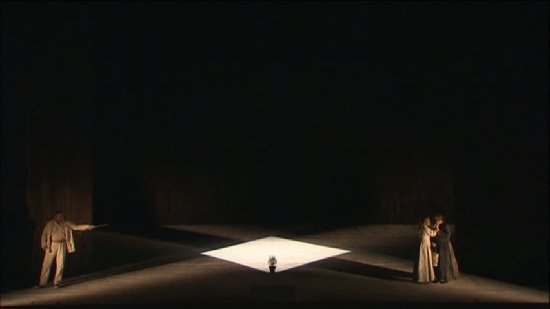
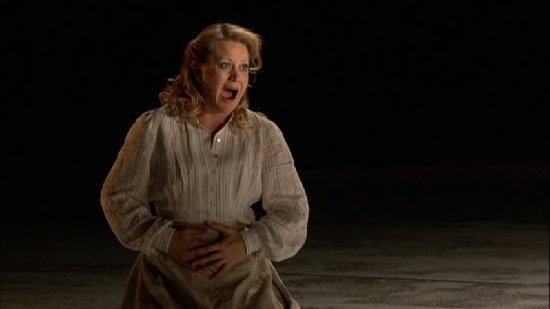
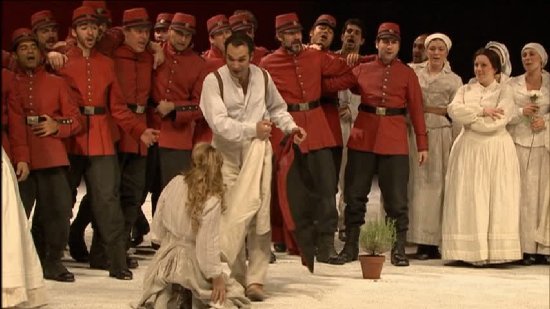
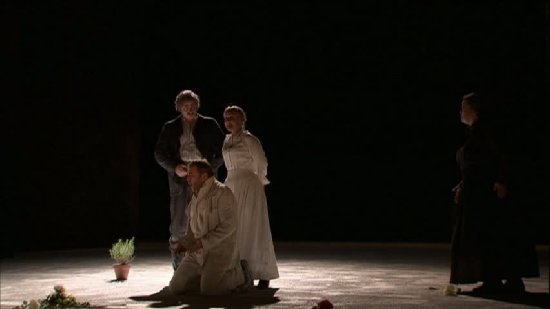
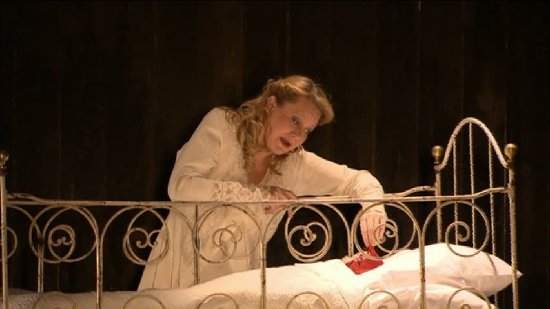
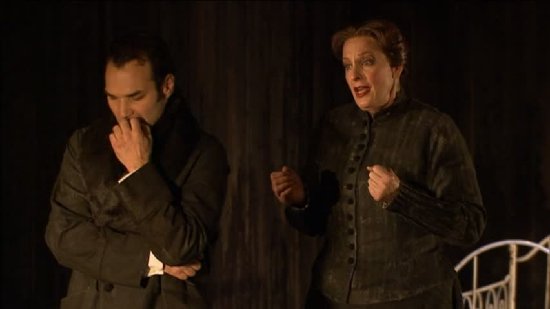
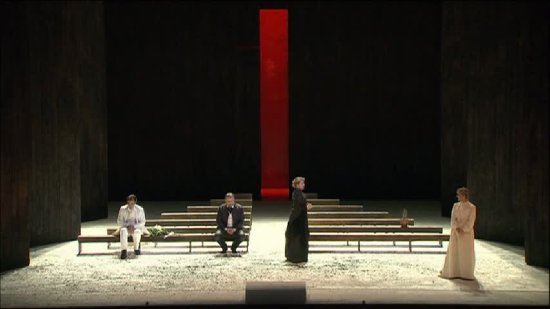
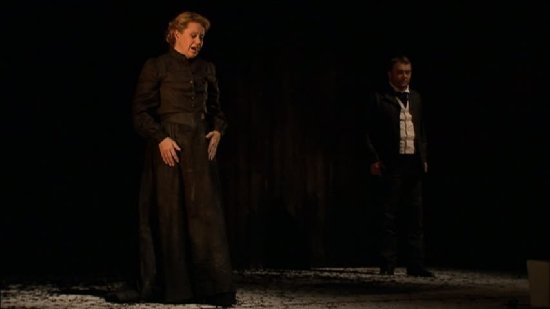
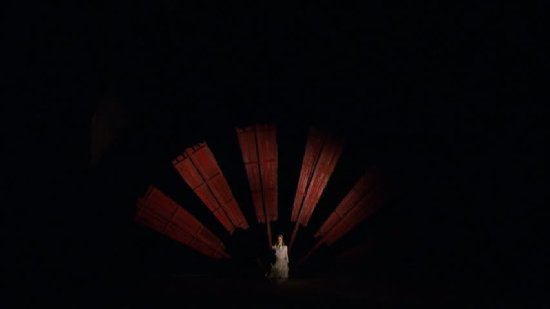
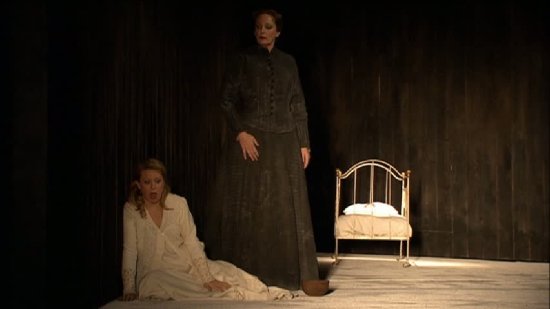
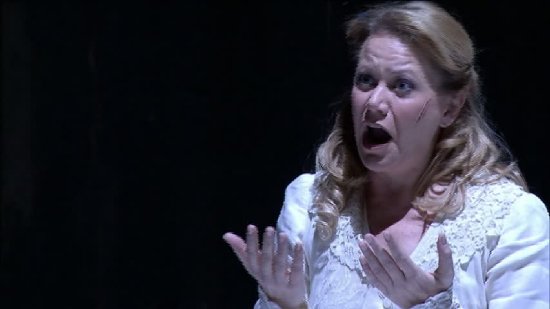
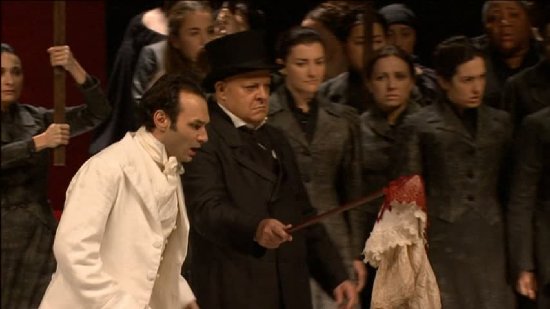
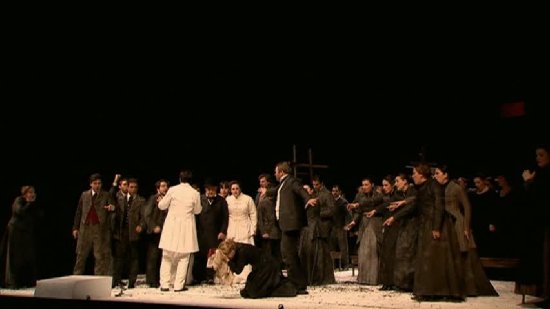
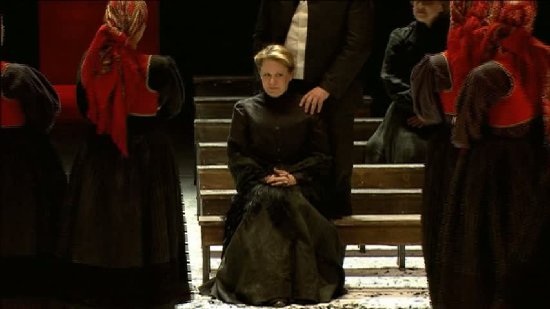
Your Opinions and Comments
Be the first to post a comment!